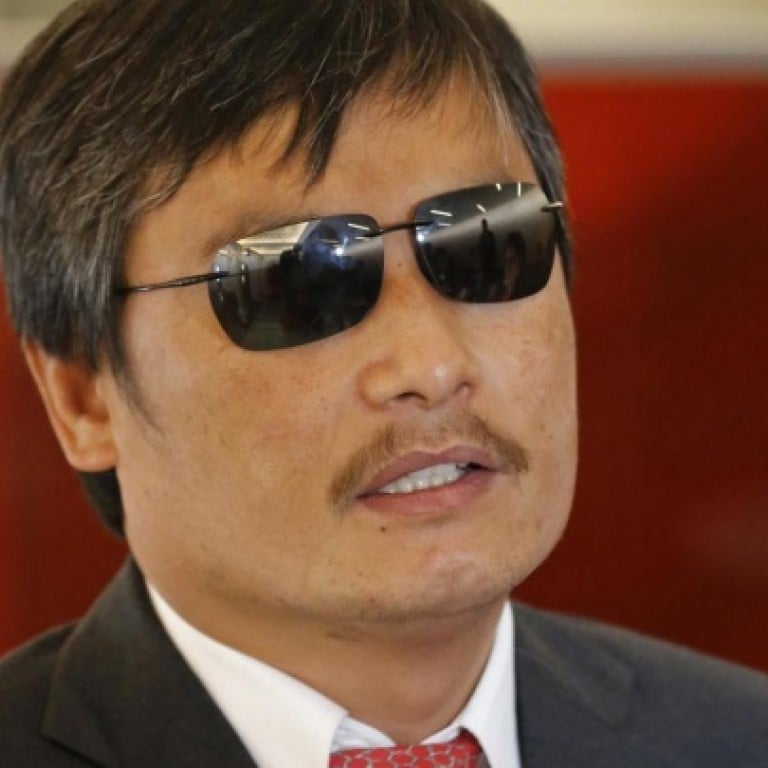
Activists' families targeted in harassment campaign
When a government critic won't bend to intimidation, his siblings, wife and children can become the focus of a harassment campaign
Chen Guangfu has not had a good night's sleep since the early hours of April 19.
The elder brother of blind activist Chen Guangcheng was woken when a torrent of rocks, bricks and beer bottles flew into his family's courtyard, smashing roof tiles and windows.
At dawn, he found dead chickens and ducks in his courtyard and funeral paper offerings scattered outside his front door.
Similar night-time attacks persisted over the next three weeks. Trees and vegetables the family had planted were uprooted and posters insulting him and his brothers were put up around the village.
Then, on May 9, he was intercepted by a black car. Two unidentified men jumped out and beat and kicked him. His 80-year-old mother's phone line was cut and his microblog account was disabled on the same day.
The string of attacks happened soon after Chen Guangcheng asked the US government at a congressional hearing on April 9 to bar around 40 corrupt mainland officials from entering the United States. He has also criticised the Chinese government in the US and Europe in recent months for rights abuses.
Chen Guangcheng, who was jailed and put under extra-legal house arrest for years for exposing forced abortions in rural Shandong , escaped and went into exile in the US last year.
But since his departure, his brother's family has not enjoyed a moment of peace.
Chen Guangfu was detained and tortured soon after his brother fled. Then, his son, Kegui , was jailed for injuring officials who stormed into his house to search for his escaped uncle. Chen Guangfu's wife was interrogated about "harbouring a criminal" for protecting their son.
If that wasn't enough, Chen Guangfu lost his job after officials pressured his employer, while fellow villagers feared being punished for talking to the family of a "traitor". In March, a family planning official went looking for Kegui's son, aged five, at his school, a move that Guangfu found intimidating.
"Through these thuggish acts, they are trying to get us to put pressure on Guangcheng," said Chen Guangfu, a farmer and former teacher. "But they've got it wrong. I know him; he won't stop saying what he should say."
Chen Guangfu is just one of many relatives of activists who are targeted by the government as a way to put pressure on the activists themselves.
China has a long history of collective punishment, or In imperial times, serious crimes such as treason would be punishable by putting offenders and their extended families to death.
Although this was abolished in the late Qing dynasty (1644-1911), New York University China law expert Professor Jerome Cohen said the practice of punishing political offenders' families had continued throughout the republican and Communist eras.
He said abuse targeting the families of political dissidents and rights activists "reveals the disturbing trend toward greater lawlessness" despite some gradual improvements in criminal justice legislation. Abductions, detentions, physical assaults and threats against family members were all contemporary examples of the principle of collective punishment in practice.
Cohen said the continual harassment of Chen's family was just part of a widespread attack on rights activists that he believed had the tacit approval of top leaders. "The current continuing, brutal effort to drive the family of Chen Guangfu into madness is surely one of the cruellest examples," he said.
Examples of harassment of activist' families abound - children and spouses are followed, and their social lives, schooling and career prospects are severely curtailed as police often go to their schools or workplaces to intimidate teachers or bosses into dismissing them. Some are barred from going abroad.
Liu Xia , the wife of Nobel Peace Prize winner Liu Xiaobo , has been put under house arrest with almost no contact with the outside world since her husband won the prize 21/2 years ago. Her brother, Liu Hui, faces up to 14 years in jail on fraud charges that he said were trumped up.
In March, veteran activist Zhang Lin and his 10-year-old daughter were detained at a police station in Hefei , Anhui , for more than 20 hours - for three hours of which the girl was held in isolation - after police accused Zhang of not having a temporary residence permit.
The daughter was also barred from attending a local school and, together with her father, was forcibly returned to their hometown in Bengbu , where they remain under house arrest.
Zhang, 49, who has previously been jailed over the 1989 Tiananmen pro-democracy movement and his critical essays, said the authorities had put pressure on his family to stop his activism and barred his friends from seeing him unless they agreed to act as their informants. His wife could not stand the continual harassment and divorced him.
"They want to completely isolate me," Zhang said. "For years, I've been enduring an extremely lonely life - both inside and outside jail."
Human Rights Watch researcher Maya Wang said authorities retaliated on activists' families because "harassing their loved ones can hurt them a lot more".

